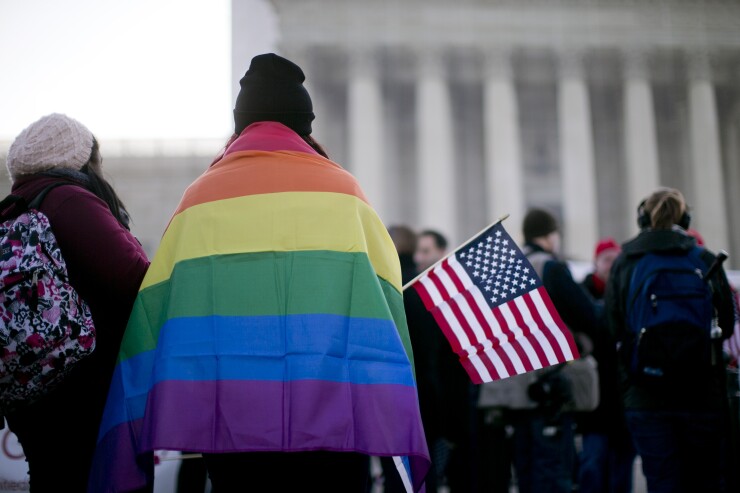(Bloomberg) – After the Supreme Court legalized gay marriage in 2015, some big companies stopped offering domestic-partner benefits, assuming that committed same-sex couples would just get married.
But that’s not the case, says the Human Rights Campaign, which is encouraging firms to offer domestic-partner benefits. Starting next year, companies will have to offer benefits for unmarried couples if they want a perfect score on the organization’s high-profile LGBT Corporate Equality Index.
Marriage still isn’t an option for many gay couples because it’s legal to discriminate against openly LGBT couples in many states and foreign countries, said Deena Fidas, director of workplace equality at the Human Rights Campaign, which today unveiled its annual Corporate Equality Index.

“The fact that you can get married on a Saturday, does not actually have implications for your legal equality on Monday,” Fidas said. “While marriage equality is now the law of the land, LGBTQ equality is not yet the law of the land.”
In 2014, about 35 percent of companies offered LGBT domestic partner benefits compared to 46 percent for married gay couples, according to the Society of Human Resources Management. In 2017, about half of companies offered same-sex domestic partner benefits, compared to 85 percent offering same-sex married benefits.
“I think they’re in a wait-and-see mode,” said Evren Esen, SHRM’s director of workforce analytics. She added that companies don’t want to add the benefit if they might decide later it’s not necessary. “We’ll have to see over time. It might be too early to tell.”
HRC’s Corporate Equality Index, which scores companies from 0 to 100, is designed to encourage businesses to create a friendly environment for LGBT workers. Companies including Wal-Mart Stores Inc. added transgender health care benefits after the Human Right Campaign made it a requirement to get a the top rating. Fidas said she expects most of the top companies will add domestic-partner benefits before the next index is out in November 2019, if they don’t already offer them.
The group scored 947 companies this year, and 609 -- the most ever -- received a perfect score. Of those, 84 percent cover unmarried partners. Last year, 517 companies got a perfect score.
“Companies still have time to prepare for next year,” Fidas said, who declined to name the companies without the benefits. “The CEI has really thrived more as a carrot than a stick.”





